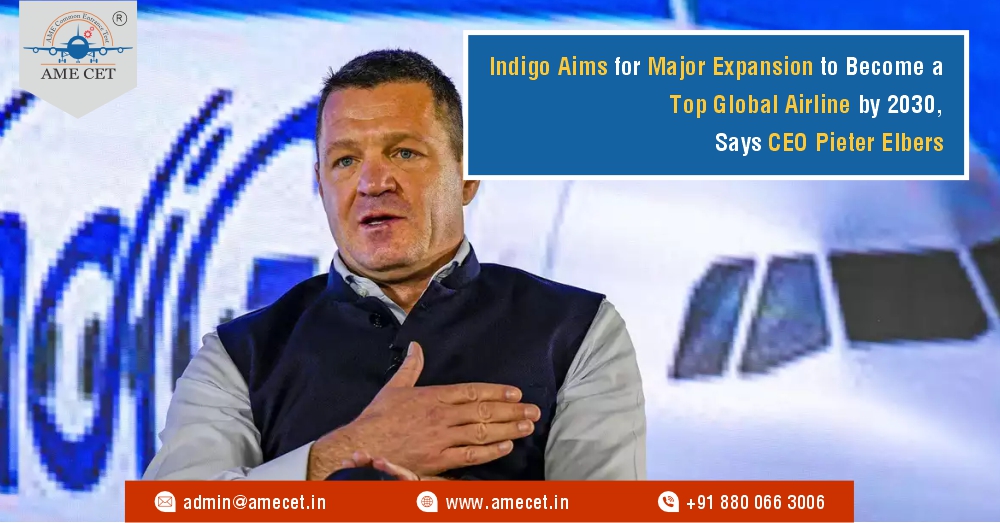
In a bold move set to reshape the landscape of international aviation, Indigo, India’s largest and fastest-growing airline, has unveiled its ambitious plans for a major expansion strategy aimed at establishing itself as a leading global airline by 2030. Pieter Elbers, the airline’s CEO, shared these transformative plans during a press conference held in New Delhi, outlining a vision that could potentially redefine the global airline industry.
A New Era for Indigo
Indigo, which has dominated the Indian domestic market with its cost-efficient and punctual service, is poised to extend its reach well beyond its current boundaries. The airline’s expansion strategy includes a significant increase in its fleet size, a substantial boost in international routes, and strategic partnerships to enhance its global footprint.
Elbers, who took the helm of Indigo in 2022, described the vision as both ambitious and necessary to keep pace with the rapidly evolving global aviation market. “Our goal is to transform Indigo into a major global player by 2030,” Elbers stated. “We believe that by focusing on strategic growth and operational excellence, we can meet the demands of a more interconnected world and provide our customers with unparalleled service across the globe.”
Fleet Expansion and Modernization
Central to Indigo’s strategy is an aggressive fleet expansion plan. The airline intends to increase its current fleet of over 300 aircraft to more than 600 by the end of the decade. This expansion will include the acquisition of next-generation, fuel-efficient aircraft designed to reduce operational costs and environmental impact. The new additions will primarily consist of Airbus A320neo and A321neo aircraft, known for their advanced technology and improved fuel efficiency.
Elbers highlighted that this fleet expansion is not merely about increasing numbers but about enhancing service quality and operational flexibility. “Our investment in new aircraft is a testament to our commitment to providing a superior flying experience,” he said. “The latest models offer greater comfort, advanced technology, and reduced emissions, aligning with our sustainability goals.”
Expanding International Routes
In line with its growth strategy, Indigo plans to substantially increase its international route network. Currently serving over 30 international destinations, the airline aims to double this number by 2030. The focus will be on expanding into high-demand markets across Europe, North America, and Asia-Pacific.
The airline is also exploring potential partnerships and code-sharing agreements with other global carriers to facilitate seamless connectivity for its passengers. By integrating into global airline alliances and forming strategic partnerships, Indigo intends to offer more extensive network options and enhanced travel experiences.
Enhancing Customer Experience
Indigo’s expansion is not solely focused on fleet and routes but also on enhancing the overall customer experience. The airline plans to introduce a range of new services and amenities to meet the evolving needs of its passengers. This includes upgraded in-flight entertainment systems, improved cabin configurations, and enhanced onboard services.
Additionally, the airline will invest in technology to streamline the travel experience. Innovations such as advanced mobile applications, improved booking systems, and efficient check-in processes are part of Indigo’s commitment to making air travel more convenient and user-friendly.
Sustainability and Environmental Goals
As part of its long-term vision, Indigo is placing a strong emphasis on sustainability. The airline has committed to reducing its carbon footprint by incorporating more fuel-efficient aircraft and exploring alternative fuels. Elbers stressed that sustainability is a core component of Indigo’s growth strategy.
“We are acutely aware of the environmental impact of aviation, and we are committed to being a responsible corporate citizen,” Elbers said. “Our focus on fuel efficiency and sustainable practices will not only help us reduce our environmental impact but also position us as a leader in the industry’s transition to greener practices.”
Challenges and Opportunities
While Indigo’s expansion plans are ambitious, they are not without challenges. The global aviation industry faces a range of uncertainties, including fluctuating fuel prices, geopolitical tensions, and economic volatility. Additionally, increasing competition from both established global airlines and emerging carriers could pose obstacles to Indigo’s growth.
However, the opportunities presented by a growing middle class, increased global connectivity, and rising demand for affordable air travel offer significant potential for success. Indigo’s established brand reputation, combined with its strategic investments and forward-thinking approach, positions it well to capitalize on these opportunities.
Looking Ahead
As Indigo embarks on this transformative journey, the airline’s success will depend on its ability to execute its plans effectively and adapt to the evolving dynamics of the global aviation industry. The next few years will be crucial as Indigo works to achieve its goal of becoming a leading global airline by 2030.
Pieter Elbers’ vision for Indigo represents a significant leap forward for the airline and the Indian aviation sector. If successful, it could not only elevate Indigo’s status on the global stage but also contribute to the broader trends shaping the future of air travel.
Category
-
Aircraft Maintenance Engineering (DGCA) (62)
-
(268)
-
Cabin Crew (1)
-
Aerospace Engineering (3)
-
Aeronautical Engineering (2)
-
Airport Management (5)
-
Aircraft Maintenance Engineering (EASA) (6)
-
Airport Ground Staff (1)
-
Commercial Pilot License(CPL) (51)
-
Aircraft Maintenance Engineering (BTech/BE) (1)
-
B.Sc. in Aviation (1)
-
AME CET (5)
